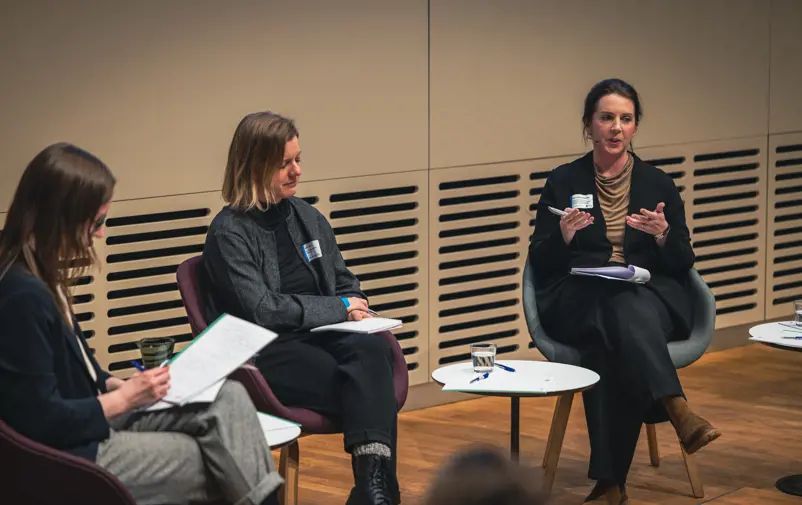
FBA's International Research Working Groups form an important part of the agency's evidence-based approach. From left: Mathilda Lindgren, FBA; Corinne Bara, researcher; Sara Lindberg Bromley, researcher.
The course targets Heads of Mission, deputy Heads of Mission and Chiefs of Staff who aim to develop their leadership skills and abilities to confront change, create secure working environments, and promote gender equality.
Throughout the training, about thirty leaders from the civilian missions of the EU's Common Security and Defense Policy (CSDP) gather, each facing different challenges and experiences to discuss. The program spans six months, incorporating both physical and digital meetings, concluding in Brussels in the spring.
To meet the diverse needs of the leaders, the course is divided into two tracks: one for Heads of Mission and another for deputy Heads of Mission and Chiefs of Staff, blending leadership knowledge with reality-based scenarios.
One participant in the program is Cosmin Dinescu, the Head of Mission for the EU Partnership Mission (EUPM) in Moldova. He finds the practical orientation of the course particularly enriching.
– It reminds us of the complexity of our daily lives and the need to have a holistic perspective in all the challenges we face, says Cosmin.
He and his colleagues are currently establishing a new mission to enhance the resilience of the Moldovan security sector against hybrid attacks.
Cosmin highlights two challenges: the heterogeneity of groups in missions, gathering experts from across the EU with different backgrounds, cultures, and organizational experiences, and meeting the expectations of the surrounding environment and local partners.
– They want to see results quickly, and we must act swiftly to build the capacity to address the breadth of hybrid attacks Moldova is currently facing. This requires us to be flexible in adapting our strategic, operational, and technical support to the existing needs, says Cosmin Dinescu.
He sees great value in being able to use the support of training colleagues, such as how to effectively leverage the expertise of team members in missions and among partners.
Anders Wiberg, a Swede who is the Head of Mission for the EU Advisory Mission (EUAM) in Iraq, also sees internal collaboration between colleagues from different countries, with various experiences and perspectives, as one of the unique challenges in peace operations.
– This is a fundamental challenge for all mission leaders and motivates me to do my best every day and use the skills I have acquired as a leader for 20 years. The complex challenges we face, especially from a security perspective, also make me constantly want to evolve as a leader to better succeed in our peace operations, says Anders Wiberg.
His key recipe for successful leadership is delegating responsibility and maintaining ongoing, effective communication with everyone in the mission. Anders appreciates the practical orientation of the training and the network and support it provides.
– It is invaluable. Building strong knowledge networks is crucial for developing good leadership. I have prioritized it throughout my career. Daring to seek advice and support is an important signal that you are open to new perspectives and want to evolve, says Anders.
Anders has already learned from the training how to balance demands in the short and long term and communicate changed conditions internally and externally.
– I am trying to motivate my staff to look at our work from different angels and change perspectives. It requires a lot from me as a leader – how I communicate and my ability to explain “why” in a good way.
Maja Svedrup, deputy Head of Mission for EU Civilian Crisis Management Mission (EUCAP) in Mali, also emphasizes the uniqueness of leading international peace and crisis management operations.
– Despite being here to improve the situation, it can quickly deteriorate. It is important to have a strong long-term vision and see opportunities in the short term to maintain the motivation of the staff.
Concepts from the course she has already applied in her daily leadership include the "teaming" concept.
– How we, as a team, better manage tasks – despite the constant rotation of staff in and out of the mission.
During the fall, FBA has launched a new leadership training targeting the most senior leaders in civilian missions within the EU's Common Security and Defense Policy (CSDP).
The purpose of the training is to strengthen mission leaders' capacity to lead and drive change. The missions are often complex, unpredictable, and have competing priorities.
The structure is guided by discussions and theory, with models and theories interwoven with scenarios, self-reflection, and real challenges from the leaders' daily lives. Although the training covers fundamental areas, the approach is iterative – the content is influenced by what emerged in previous sessions. Focus areas:
MORE FROM HOME
Participating in FBA’s International Research Working Groups offers a unique opportunity for researchers to contribute to the work for peace, security, and development. The thematic scope is now expanding with five new groups, inviting interested scholars from around the world to apply.
2025-03-13 16:49FBA has both increased and adapted its work in Ukraine in the wake of Russia's invasion.
FBA in UkraineKlara Grenhagen works as a specialist at FBA's Africa unit with a focus on dialogue, reconciliation and peace processes.
More about our expertsFBA is part of Sweden’s development aid within the area of peace and security
Read more about the countries where we work